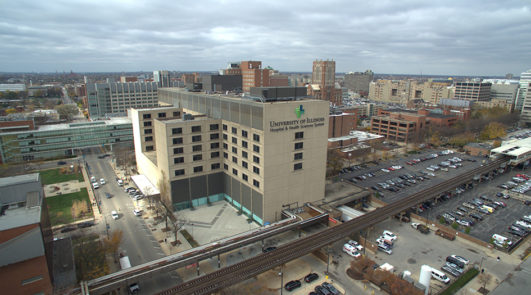PhD in Biomedical and Health Informatics
Preparing informaticians for the future
Today’s decision-making is increasingly driven by data and collaborative practice. Health information technology is both productive and disruptive. We’ve put technology in the hands of more people than ever before. Now we must overcome the usability challenges that have emerged and mine the data that technology is producing.
UIC’s PhD in biomedical and health informatics (BHI) prepares future academicians and healthcare industry leaders. You will join those who are advancing new ideas to enable complex decision-making and promote health information technology.
We focus on research, scholarship and interprofessionality, working in teams that include a range of professions and settings. Our curriculum prepares you to solve today’s complex knowledge management issues—and ensure that these solutions are effective for the healthcare professionals who use them.
Our program is structured to be delivered face-to-face, full-time, using an extensive mentorship model. It is contemporary in terms of technology-based learning, with a small number of courses delivered online or in a blended model.
Links
Pride points
-
96 credit hours comprise the program
-
1st program of its kind in Illinois
Access to UI Health Resources

Access to UI Health Resources
Students have access to a 495-bed tertiary care hospital, 22 outpatient clinics, 13 FQHCs and seven health science colleges
Your Career
US News & World Report: Education recently noted the high demand for specialists in health informatics. Career opportunities abound in industry and academia. Chicago is an international center of health care and biomedical research, with seven medical colleges and over 50 hospitals located in the area. Many major U.S. health information technology firms invest in research and development in this highly competitive industry.
Job titles include:
- Associate manager for clinical informatics
- Clinical informatics research scientist and senior member research staff
- Post-doctoral fellow for scientific informatics
- Director of medical informatics
The dramatic rise in the number of health informatics degree programs at universities nationwide means an increased demand for faculty trained at the doctoral level.
Learn from the best
Understanding by Doing
Our program emphasizes research and scholarship. You’ll perform at least 40 hours of research in your focus area, but you won’t do it alone.
Each student has two mentors: a primary mentor for specialized research, and a secondary mentor for methodology. Your research will respond to challenging informatics questions that involve all the health professions across all health care settings—urban and rural.
We collaborate with colleagues throughout the University of Illinois Hospital and Health Sciences System, dedicated to health equity. We draw upon UIC’s collective expertise in seven health sciences colleges, as well as the colleges of Engineering, Business Administration, Liberal Arts and Sciences, Architecture, Design and the Arts and the Library of the Health Sciences.
This academic environment allows both traditional investigation and community-based approaches to research.
We're here for you

We’re here for you
Still wondering what a PhD in biomedical and health informatics can do for you? We’re here to answer your questions.
You can contact Catherine Eccher, the admissions coordinator at:
Email cecche1@uic.edu
Address 1919 W. Taylor St.
250 AHSB, MC 530
Chicago, IL 60612